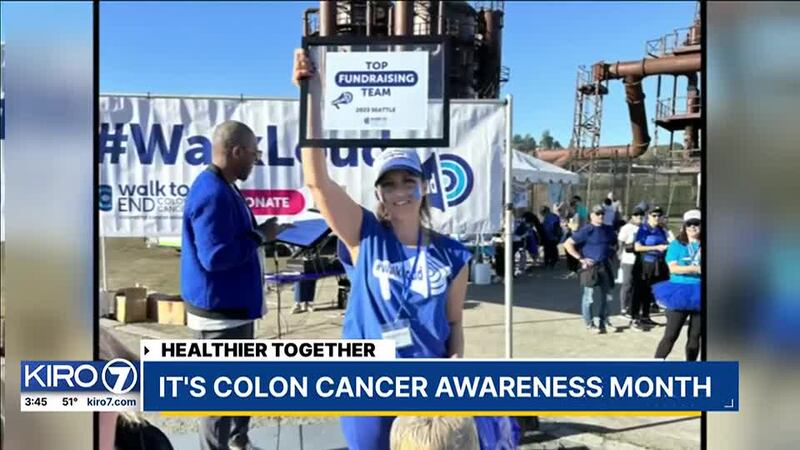SEATTLE — The age for screening for colorectal cancer has been lowered in recent years to try to catch the disease earlier, but some people are wondering whether the age threshold should be lowered even more; including a woman who was diagnosed with the disease at a very young age.
Natalie Phelps of Bainbridge Island is a current patient at Fred Hutchinson Cancer Center in Seattle. She spoke to KIRO 7 about her journey after learning that she had stage 4 colorectal cancer.
“I’m at a pretty good stage, I have a low level of disease. I have a few active tumors in my lungs… I’ve been in worse situations in the past 3.5 years,” said Phelps.
Phelps was diagnosed at age 38. She was nowhere close to the age for screening, and after giving birth to her second child, she had a cancer fight on her hands, one that she absolutely was not expecting in any shape or form.
“The diagnosis was a shock. At the time, I didn’t have anyone in my life that knew that was a cancer patient,” she said.
Phelps is speaking out during March, which is Colorectal Cancer Awareness month, and she’s urging young people to pay attention to the disease.
“It wasn’t on my mind. I was not thinking there was any chance that I would have cancer, let alone stage 4 cancer.”
William Grady, Professor of Gastroenterology at the University of Washington, also spoke to KIRO 7 about colorectal cancer.
“Colorectal cancer is the second most common cancer in the US,” he said.
He says it’s now a problem for younger people and that the future could see even more people getting diagnosed with the disease.
“I am very concerned about it…the rate of colon cancer in younger people is continuing to increase over the past 20 years,” said Grady.
Colonoscopies are now recommended at age 45. The screening age was lowered from 50 in 2021.
While a colonoscopy still is the gold standard for testing, others are available, according to Grady.
“Stool-based tests, there are two of those, FIT tests and Cologuard…the stool-based tests are convenient, you can do those at home, too,” he said.
Dr. Grady says a blood test has also proven accurate. Available for two years, it’s undergoing FDA approval, and patients could have access this summer.
“When offered that option, about 90% of the people would choose to take that test. If you detect colorectal cancer early, it’s highly treatable and can be cured,” said Grady.
Grady understands that a colonoscopy can be an inconvenient test for many people. It often takes preparation to clear a patient’s bowels, and then will require a outpatient procedure that often requires the patient to be driven home afterward. It’s one reason why rates for screening are a bit low. Dr. Grady estimates the rate for screening now is about 50%, so only half of people who should be screened are actually doing it. He says 150,000 people are diagnosed with colorectal cancer each year, with 50,000 dying each year, and any test that screens more people could reduce cancer rates and deaths.
Phelps began treatment in late 2020 and continues to fight, but she’s grabbed the mic to alert people about colorectal cancer and says starting to screen at a younger age could prevent people from going through what she has.
“I definately think that lowering the age from 50 to 45 for the start of (having a) colonscopy is a good step in the right direction. I’d like to see it lowered even more,” she said.
Dr. Grady also suspects that more age modifications could be coming as it relates to colorectal cancer.
“I suspect in the next five years it might decrease down to age 40,” he said.
©2024 Cox Media Group








